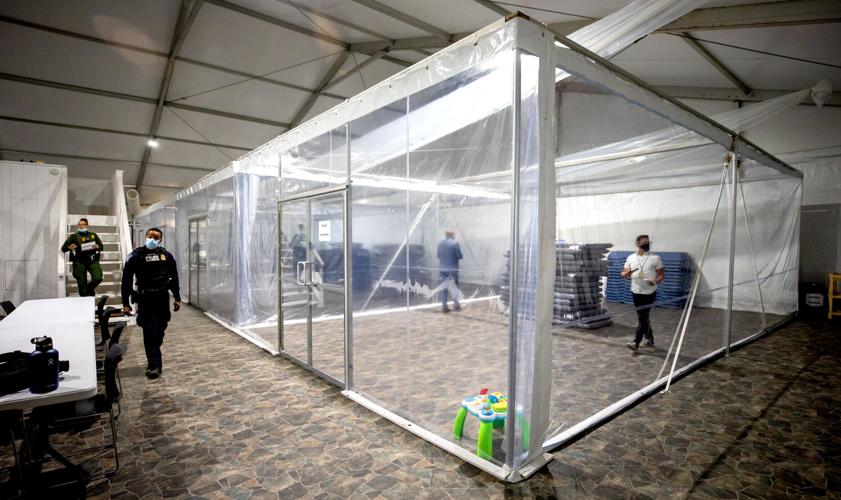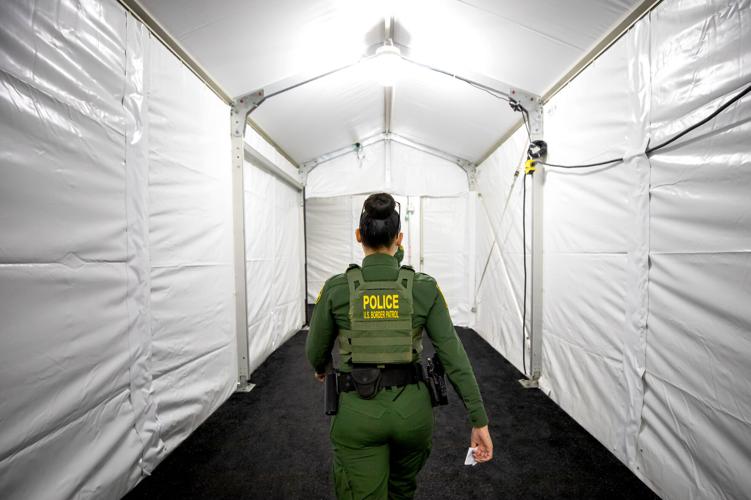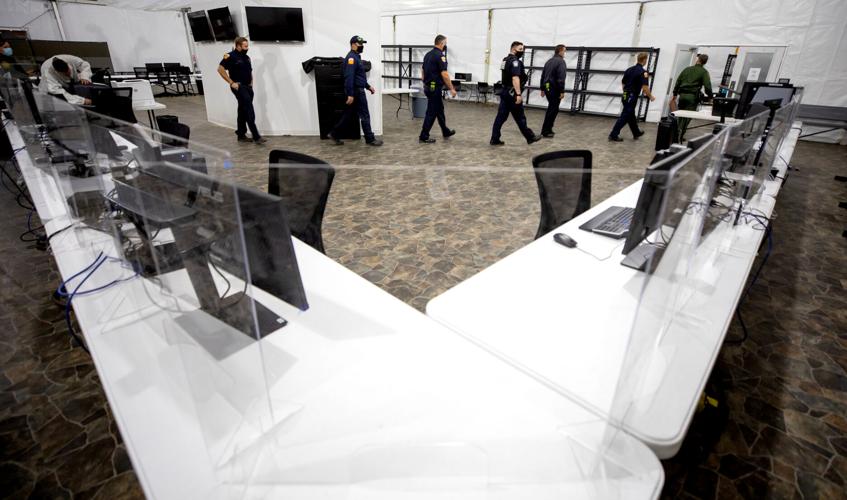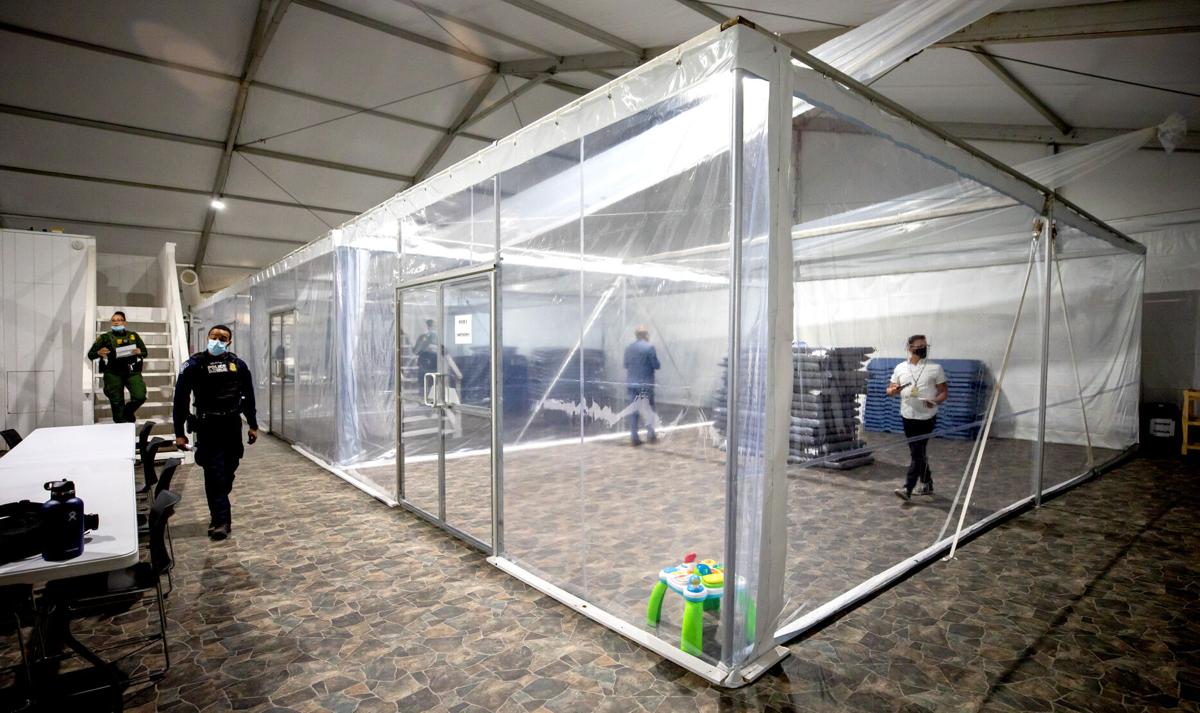A new facility to temporarily house migrant children and teenagers is set to open as early as next week, federal officials said during a media tour on Wednesday.
The 80,000-square-foot facility, which includes numerous rooms connected under white tents that are supported by steel beams, will house children and teens who cross the border without their parents.
Border Patrol officials plan to process them within 48 hours of their arrival and send them to the Office of Refugee Resettlement, which will place them with family or sponsors living in the United States.
The facility is needed due to a recent increase in unaccompanied children encountered in the agency’s Tucson Sector, Border Patrol officials said. Last month, agents in the Tucson Sector encountered about 2,300 unaccompanied children, up from about 800 each month from October to January, according to Border Patrol statistics.
Until the facility opens, unaccompanied children are housed at Border Patrol stations that “are not built to house that population,” John Modlin, interim Tucson Sector chief patrol agent, said before the media tour.
He described those accommodations as “basically small holding cells” with cement benches and cement floors. The new facility, in contrast, is a “much more appropriate place” for children, Modlin said.
“Not only will this provide a space for these children to be until they can be properly adjudicated, it increases our capacity to move people through the system faster and ultimately lets the Border Patrol agents get back to doing what Border Patrol agents are supposed to be doing, which is securing the border,” Modlin said.
The facility is located on East Los Reales Road between Tucson International Airport and Interstate 10. The sound of aircraft overhead drowned out the voices of Border Patrol agents repeatedly as they gave the tour.
Goal: A good place for kids to be
The inside of the facility was clean and well-lit during the tour.
It has air conditioning, on-site laundry, individual shower stalls and toilets with in-ground plumbing.
Food is provided by a contractor according to guidelines set by a nutritionist, said Agent Anthony Divens. Children will have access to various types of food that will give them the appropriate sustenance, “rather than just feed them burritos.”
Sleeping mats were stacked in the middle of one of the “pods” where children and teenagers will sleep. A television set played cartoons in the corner. The pods were separated by clear, plastic walls about 7 or 8 feet tall.
A large recreation area with artificial grass and fencing was set up outside. One room had playpens and toys for small children.
“We’re going to try to make this as good of a place for kids to be as we can,” Divens said.
During the day, children can go to the recreation yard or multipurpose room, “so they can just be somewhere, rather than stuck in one little pod,” Divens said.
A federal contractor tests each child for COVID-19. If children test positive, they will be sent to a hospital. They will not be given coronavirus vaccines at the facility.
A row of 15 small rooms was set up so children can make domestic phone calls. The phone numbers for consulates will be posted in the rooms. If children struggle to figure out how to make a call, one of the roughly 100 agents who work at the facility will help them, Divens said.
Contract worth up to $105M
The intake area had dozens of computers set up to process children when they arrive. A bank of computer screens nearby showed camera views in various parts of the facility.

A U.S. Customs and Border Protection agent leads a group through a hallway during the tour of the large new tent-like facility for migrant children that is expected to open as soon as next week in Tucson.
The children remain in Border Patrol custody while at the facility. If children jump the fence, agents will go after them, Divens said.
CBP officials said the facility could hold up to 500 people, but spacing restrictions due to the pandemic will reduce capacity to about 200 people.
As it stands, it will only be used for children encountered in the Tucson Sector. A similar facility is being built in the Yuma Sector, which saw an increase from fewer than 100 unaccompanied children in October to nearly 800 in March.
CBP officials contracted with Deployed Resources, a firm based in Rome, New York, to build the Tucson facility. The contract is worth up to $105 million, including about $34 million to set it up, and runs until October 2022.
The facility was built in about six weeks, Divens said. He could not say why the site was chosen or why the cost was higher than for a $15 million facility built in Yuma in 2019.

A group of firefighters and a Customs and Border Protection officer walk through the intake area during a tour of the large new soft-sided facility in Tucson for migrant children.
“Nothing compared to being with a family”
While unaccompanied children are housed at the new facility, migrant families are either quickly expelled to Mexico or released to the care of shelters, such as the Casa Alitas Welcome Center in Tucson. Casa Alitas, which is run by Catholic Community Services, does not take in unaccompanied children.
The plight of unaccompanied children is “really overall unfortunate” and attention needs to be paid to the “initial problems that are causing families to be separated, as well as having them leave their countries,” Diego Piña Lopez, program manager at Casa Alitas, said after the tour.
“I think they covered a lot of important things in there, but it’s nothing compared to being with a family,” Piña Lopez said.
“There is an effort (by the Border Patrol) to try to make it as comfortable as possible,” he said.
He noted the “consideration” taken by the Border Patrol, such as setting up the phones, but he wanted to know more about how children will be able to access the phones and other resources on a daily basis.
Washington D.C. might be awash with politicians quick to cast blame on one side or the other, but experts say we are forgetting the real victims of the crisis who are the unaccompanied children at the U.S. and Mexican border. Interviews with legal experts and activists about the situation and the impact it is having on the children in detention centers waiting to be united with their families.
Photos: Large, tent-like shelter for migrant children in Tucson
New CBP migrant shelter
Updated
A United States Customs and Border Protection officer and agent talk to a tour group about the tent-like sleeping quarters during a tour of the new tent-like facility for migrant children at 4550 E. Los Reales Rd. in Tucson, Ariz., April 28, 2021.
New CBP migrant shelter
Updated
A United States Customs and Border Protection agent leads a tour group through a hallway during a tour of the new tent-like facility for migrant children at 4550 E. Los Reales Rd. in Tucson, Ariz., April 28, 2021.
New CBP migrant shelter
Updated
A toy is photographed inside a sleeping pod during a tour of the new tent-like facility for migrant children at 4550 E. Los Reales Rd. in Tucson, Ariz., April 28, 2021.
New CBP migrant shelter
Updated
United States Customs and Border Protection agent stands in the center of the intake room during a tour of the new tent-like facility for migrant children at 4550 E. Los Reales Rd. in Tucson, Ariz., April 28, 2021.
New CBP migrant shelter
Updated
A soccer ball is photographed inside the recreation area during a tour of the new tent-like facility for migrant children at 4550 E. Los Reales Rd. in Tucson, Ariz., April 28, 2021.
New CBP migrant shelter
Updated
A tour group takes photos and videos of a room inside one of the sleeping pods while a United States Customs and Border Protection officer and agent walk around during a tour of the new tent-like facility for migrant children at 4550 E. Los Reales Rd. in Tucson, Ariz., April 28, 2021.
New CBP migrant shelter
Updated
A group of E.MT.'s and a United States Customs and Border Protection officer walk through the intake lobby to the medical room during a tour of the new tent-like facility for migrant children at 4550 E. Los Reales Rd. in Tucson, Ariz., April 28, 2021.
New CBP migrant shelter
Updated
A United States Customs and Border Protection officer leads a tour group past another group during a tour of the new tent-like facility for migrant children at 4550 E. Los Reales Rd. in Tucson, Ariz., April 28, 2021.
New CBP migrant shelter
Updated
A reporter takes video of the isolation booths inside the intake room during a tour of the new tent-like facility for migrant children at 4550 E. Los Reales Rd. in Tucson, Ariz., April 28, 2021.
New CBP migrant shelter
Updated
A shelving unit with medical supplies is photographed inside the Medical area during a tour of the new tent-like facility for migrant children at 4550 E. Los Reales Rd. in Tucson, Ariz., April 28, 2021.








